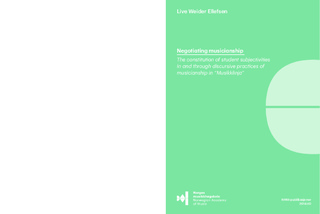| dc.description.abstract | The study has been conducted as an in-depth investigation of a Norwegian “Musikklinje”; a three-year upper secondary educational programme in music. Combining an ethnographic design of participant observation and interviews with an analytical framework based on Foucauldian discourse theory and performativity theory as elaborated by Judith Butler, the study has aimed at understanding how student subjectivities are constituted in and through discursive practices of musicianship in Musikklinja. To facilitate such an understanding, the study has examined how discourses of musicianship are practiced within and across a range of Musikklinja sites, and how students engage in performative work to achieve legitimate positions of music studenthood within these discourses. In this examination, analyses and discussions of how relations of power/knowledge are enacted – at micro and macro levels of discourse – have been important. Musikklinja, the thesis argues, works by relations of power/ knowledge that include the relations students enact and establish to understand themselves, and make themselves understandable, within discourse. Fieldwork was undertaken over a period of seven months. To create a productive space for interpretation and analysis, three different research methods, generating different forms of empirical representations, are employed. In fieldnotes produced through participant observation, the researcher’s descriptions, reactions and field analyses are documented. Group interviews allow access to students’ representations as collectively enacted when sharing and establishing stories and thoughts on the interview topics. And individual interviews contribute the representations of the students when performing according to the power/knowledge relations of the interviews. Analyses are carried out in three stages. Stage one consists of a mapping of Musikklinja practices of musicianship; a coding and categorization that includes all fieldnotes and interview transcripts. In stage two, discourses of musicianship and strategies of performative negotiation are identified and examined in a theory-informed, abductive coding and analysis of selected practices. Building upon insights generated at stage one and two, stage three aims at understanding processes of performative subjectivation through in-depth analyses of selected empirical events across five sites of subjectivation. The study’s findings suggest that dedication, entrepreneurship, competence, specialization and connoisseurship are prominent discourses at play in Musikklinja practices of musicianship. It is by these discourses that the young people of Musikklinja are socially and institutionally identified and addressed as music students, and it is by understanding themselves in relation to these discourses that the students achieve music student legitimacy. The findings also propose that a main characteristic in the constitution of music student subjectivity in Musikklinja is the appropriation of discourse, even where resistance can be noted. Thus, the negotiation of discursive meaning intrinsic to performative subjectivation – in the present study, the negotiation of musicianship – could, in the case of Musikklinja, be understood as an appropriation of discursive meaning; an appropriation of musicianship. However, within the overall strategy of accepting and appropriating Musikklinja discourse, students subtly negotiate, twist and turn discursive meanings by enacting counter- or complementary discourses, subverting performative interpellations, alternating between taking the initiative and withdrawing, and positioning themselves more or less at the periphery (or at the core) of discourse. Enacting the music student subject, students avoid some impositions by replacing them with others. They appropriate – adapt, shift, juggle, subvert – the available discourses in ways that enable and empower their discursive legitimacy as music students. The thesis aims to contribute to an understanding of how Musikklinja, as a music educational institution of discourse, enables, enacts and manages thoughts, actions, objects and subjects of musicianship. In examining how relations of power/knowledge play out in actual situations and events where students are subjectivated in and through discourses of musicianship, the thesis also attempts to contribute to an empirically anchored theorization of the relations between subject and discourse, agency and subjectivation, knowledge and power. | nb_NO |
